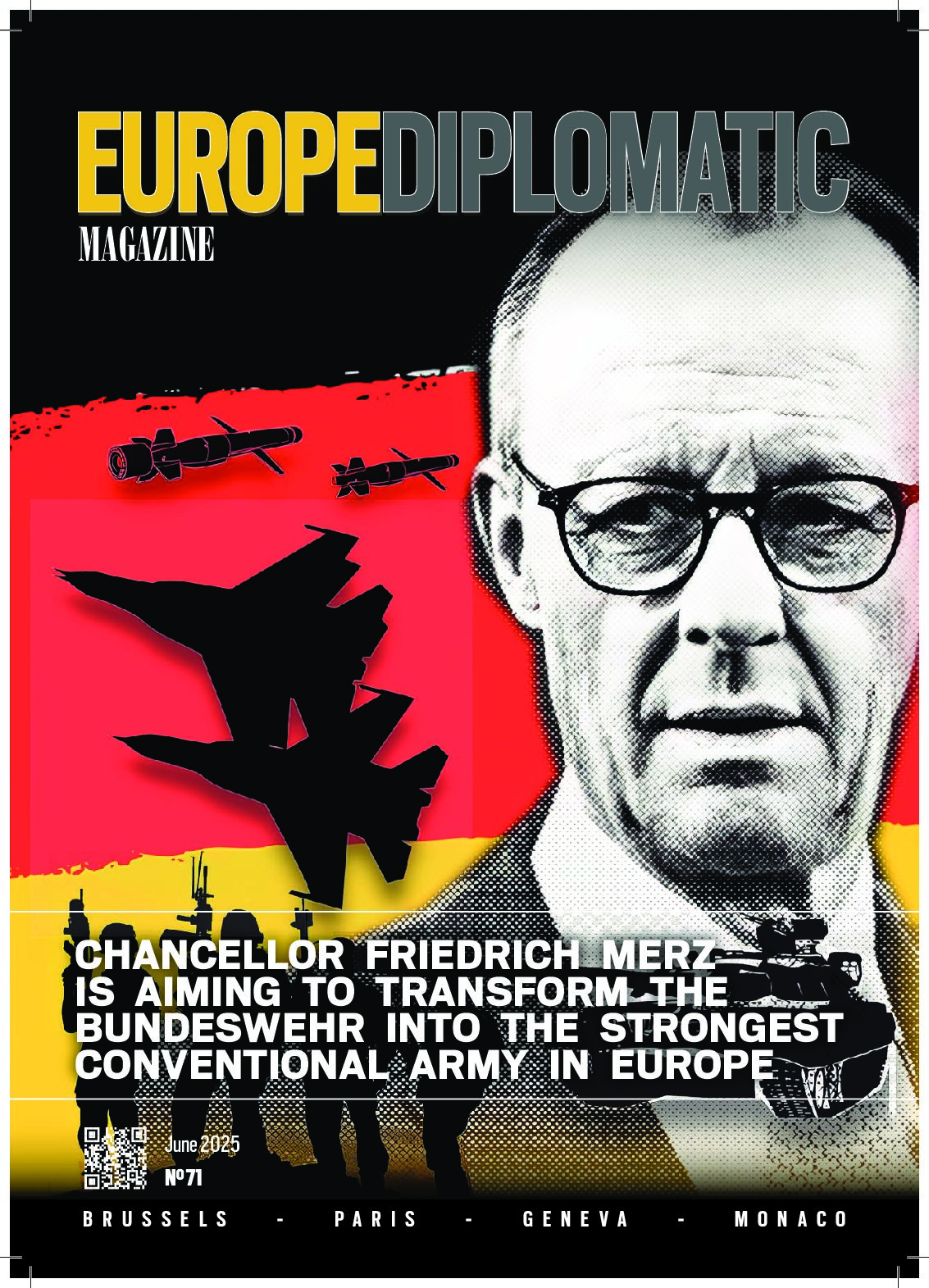© wutzkoh
I am happy to apply for and to receive my old person’s bus pass each year, allowing me to travel free of charge by bus close to my home. It’s very handy for getting to the local shops. Some people expect much more in terms of free travel, services and gifts they shouldn’t get. I don’t demand, however, a free jet, first class, to anywhere in the Middle East. I’m nowhere near being important enough to merit such treatment and if anyone offered it to me I should be deeply suspicious. However, if somebody decided to probe my legal entitlement to an old person’s bus pass, I’d have nothing to fear, because I am old. The same level of entitlement cannot be true for Henrik Hololei, director general of the European Commission’s transport department. He managed to wangle himself a free flight or two (or several) to the Middle East at the behest of Qatar, a country whose name, by now, must strike fear into the hearts of politicians and senior EU officials, whilst causing a speeding of the pulse rate among law enforcement and anti-corruption officials. Fairly or unfairly, the name “Qatar” seems to have become synonymous with corruption and graft. I certainly don’t feel corrupt, riding a bus into town. I do it because it’s not power that corrupts but the passage of the years, while the corruption is physical (and all too noticeable). As my mother used to say: “It’s a terrible thing to grow old, but it’s better than the alternative.”
There is a fine line to be drawn between a trade in goods and legitimate services and a trade in influence. It would seem to be a line that Qatar finds very hard to see and even harder to abide by. In this latest case, Belgian law enforcement agencies say there is evidence that politicians at the European Parliament have accepted cash for writing unmerited encomia about Qatar while downplaying the tiny country’s labour rights abuses, particularly during the run-up to last year’s World Cup, and it succeeded in turning the International Labor Organisation, which is a United Nations body, from one of the country’s most strident critics into an ally, according to The New York Times.

The campaign was generously funded with a massive lobbying operation to prevent an investigation into its practices. Apart from generous free travel being facilitated for a senior figure, officials from Qatar’s labour ministry asked the UN agency not to comment on what it had seen there in case it overshadowed the competition itself. That would have been unfortunate for a country determined to appear to the world as ‘squeaky-clean’, although Qatar, it would seem, may be squeaky but not especially clean.
Henrik Hololei, meanwhile, the Director-General of the European Commission’s DG MOVE, the EU’s Directorate General for movement and transport, faced an internal investigation in the light of the fact that he had travelled several times at the Qatar government’s invitation and expense between Qatar and the EU during the period 2015 to 2021, a time during which his department was supposed to be involved in negotiating an EU-Qatar air transport deal. He has not been sacked, however, although there are plenty of people who say he should have been. It seems that: “At his request, the College [of Commissioners] has decided to appoint Henrik Hololei, who is the general director for mobility and transport, to the position of hors-classe (unclassifiable) advisor in the DG for international partnership from the 1st of April,” according to the Commission’s chief spokesperson, Eric Mamer. We should remember that the 1st April is known in some circles as “All Fools’ Day”. In fact, it would appear that Hololei, clearly no fool, acted within the rules anyway: his missions had all been official and they followed the rules of the time. The concern is simply over the fact that Hololei approved his own flights, having carried out his own conflict of interests analysis, apparently without the intervention of advisors. Some MEPs feel Hololei should face tougher penalties. The argument goes that if you leave possible culprits to decide their guilt or otherwise you can say goodbye to justice.
| TRY AGAIN, BUT HARDER
Corruption is a global phenomenon but the fact that it’s so common doesn’t mean it should be ignored. Now the United Nations (UN) has signed an agreement to tackle corruption world-wide, although the decision was not widely reported. It was last November in Geneva that UN Assistant Secretary-General Nikhil Seth signed a partnership agreement with the Global Organisation of Parliamentarians Against Corruption (GOPAC), chaired by a former attorney general of Qatar, Ali Bin Fetais al-Marri.
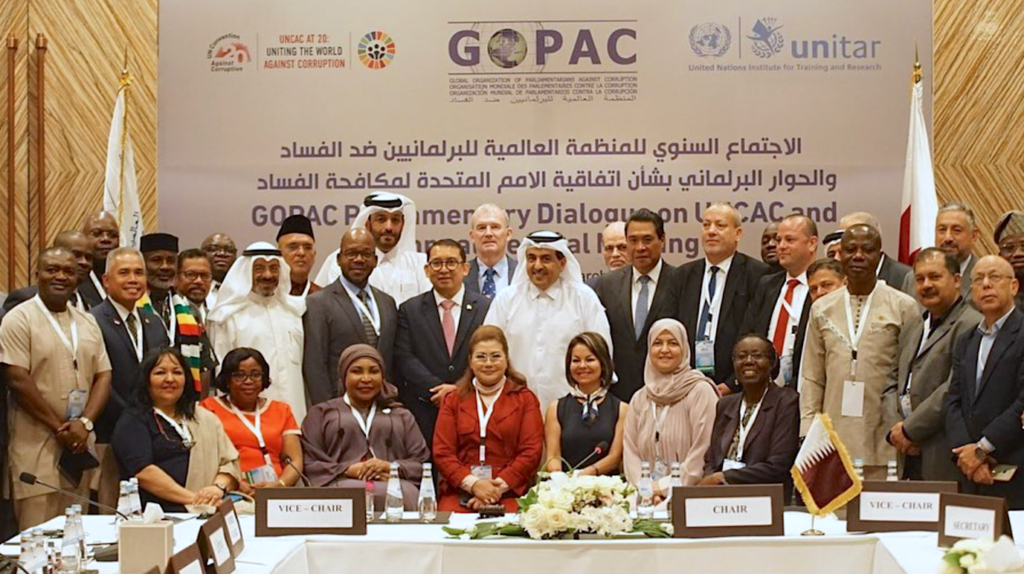
The aim, in theory, is to toughen up the fight against corrupt practices in politics, including through the development and publication of a training manual by the Observatoire Géostratégique de Genève (OGG). This year and next, training workshops and round-table discussions will be held to put the problem under the microscope and, as officials examine the scourge of corruption, look in detail at the damage it can do. The agreement was signed by the OGG and the United Nations Institute for Training and Research (UNITAR), although questions have been raised about the involvement of al-Marri, a 58-year-old magistrate who has served as Public Prosecutor for Qatar from 2002 to 2021, and whose probity has been questioned on many occasions during his term of office. There have been various legal complaints about him, especially in Switzerland, France, the US and the UK. Furthermore, there is precious little data on GOPAC’s activities over the past two decades. Even the style and wording of the organisation’s Website have been questioned and seem to be out of date.
What’s it all about? It would seem we have to wait to find out. Like most sensible people, I’m all in favour of politicians from various countries collaborating across frontiers to eradicate self-serving dishonesty, if that’s what they’re really doing. But there are just a few too many queries to set it all aside as “100% good news”. One member of the ruling family in Qatar, for instance, Sheikh Ahmed Khalid Bin Mahammad Bin Ali At-Thani, of the House of Thani, brought a legal complaint against Al-Marri in both France and Switzerland for alleged money laundering in late 2021, drawing public attention to “signs of corruption, influence peddling, misappropriation of public funds and money laundering abroad”. It’s a fairly comprehensive list of alleged wrong-doings for personal pecuniary advantage. It must be mentioned that quite a lot of people and organisations don’t really like Al-Marri very much. One complaint, for instance, was filed against him in France by businessman Jean-Pierre Marongiu, who accuses Al-Marri of being responsible for his arrest and conviction on spurious grounds that led to his imprisonment in Qatar from 2013 until 2018, accused of issuing dud cheques and also of violating a rule banning him from leaving the country. He denies both charges. In any case, a 5-year jail term seems on the face of it to be rather severe for minor financial crime.
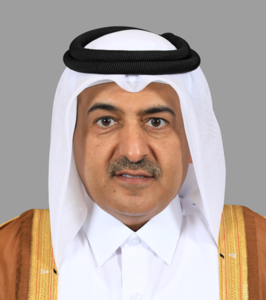
The story is that a system of “guardianship”, known as “kafala”, and which is unique to the Arab Gulf nations, allowed a member of the Qatari royal family (there seem to be hundreds of such people; crowns must be ten-a-penny there) to hold a 51% share in his company without investing a single cent in it. Marongiu was allegedly swindled by the royal in question, leading to his – Marongui’s – incarceration with al-Marri’s complicity. More recently, a member of the French parliament, Philippe Latombe, referred some of Al-Marri’s financial transactions to the Public Prosecutor in Paris, alleging some very suspicious financial transactions. Latombe alleges that al-Marri was awarded a job as prosecutor with a monthly salary of €12,000, but he quickly amassed enough to buy a private hotel in Paris for €9.6-million. Not a bad investment, I think you’ll agree, especially as in the same year he acquired various other properties, all of them expensive. It’s claimed that he also intervened to obtain freedom for two members of his own family, imprisoned by the United States at Guantanamo for fighting on the side of Al-Qaeda. Al-Marri’s French lawyers claim he’s a victim of a smear campaign with very little evidence to support the various claims. In the extremely murky waters of Middle Eastern politics, that could even be true. The big question is: “does it matter?” I suppose if no-one outside that “gilded inner circle” comes to any harm, then the answer is “no”. I’m just certain that it’s not a place in which I’d like to do business or invest money.
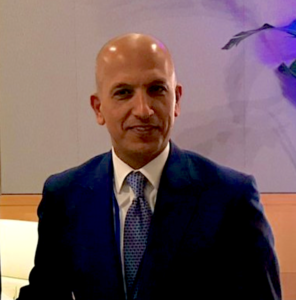
Towards the end of last year, the European Parliament banned Qatari representatives from entering the building, as well as suspending legislation connected to Qatar, such as visa liberalisation, because of allegations that Qatar had tried to influence MEPs and officials, which it denies. A Qatari diplomat warned that it could damage cooperation on global energy and security issues. The statement claimed that MEPs had clearly been misled. I think misleading people lies at the heart of all the controversy, although it’s not clear exactly who is misleading whom. And underneath it all is fear over energy supplies as Russia continues its unjustified war with the West and the fear that by upsetting Qatar Europe could be cutting off a possible gas supply. It’s worth remembering that in 2021 Doha supplied around a quarter of the liquid natural gas (LNG) the EU consumed.
The probity of the ongoing investigation has been threatened by leaks to the media, but not sufficiently to put the inquiry at risk. As if Qatar wasn’t in enough hot water over various corruption allegations, it has now charged its former finance minister, Ali Sherif al-Emadi, with embezzlement. In fact, al-Emadi was arrested in 2021 but very little information about the case has been released. According to the Qatar news agency he and several associates will now face trial. The report goes on to say that in view of the fact that evidence found among the case documents proves al-Emadi’s guilt in a variety of crimes – bribery, the appropriation of public money, abuse of office, abuse of power, damage to public money and money laundering – the Attorney General issued an order to refer the accused to the Criminal Court to decide on punishment. al-Emadi has made no comment about the accusation or about his arrest and detention, despite having been one of the country’s most capable officials and having held a number of senior posts. The accusations relate to his time as finance minister.
| A TANGLED WEB
“O what a tangled web we weave,” wrote Sir Walter Scott in his lengthy 1808 poem “Marmion” about the battle of Flodden Field, fought between England and Scotland, “when first we practise to deceive!” It was true at the time of the battle, in 1513, when Scott wrote his poem in 1808, and, of course, it still is. But there is no shortage of accusations of fraud and malfeasance involving Qatar. Sorting out the accusations from the certainties is no easy task.
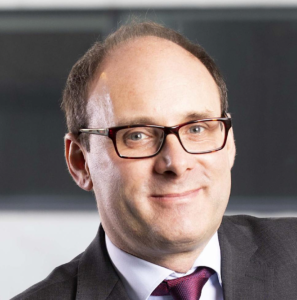
Even reporting on the progress of the investigation is a challenge. The whole Qatar issue overshadows other work being carried out to prevent fraud and corruption. The 32nd annual meeting of the OLAF Anti-Fraud Communicators’ Network (OLAFAFCN) was held in Brussels in March 2023, attracting some sixty participants from throughout the EU’s anti-fraud community, to discuss the best communication practices and to share recent experiences in tackling the issue. Much of the conference’s time was taken up with discussing the best ways to protect the funds needed by Ukraine to ensure its economic and military resilience. In fact, Ukraine rather dominated the conference. The rôle of Qatar clearly is not connected with the war, nor with Russia’s military and territorial aspirations. The conference also discussed ways of enforcing EU sanctions against Russia, and again, this did not concern Qatar. Keeping all parties informed is important, as OLAF’s Deputy Director General, Andreas Schwarz, told delegates. “Communication and cooperation are vital components in the fight against fraud,” he said, “and it is important that they take place at every level.” Of course, if there are so many varied things going on it becomes extremely hard for people to follow.
The most recent scandal began in 2019, when Qatar started to channel money to Antonio Panzeri, a former member of the European Parliament, and to Eva Kaili, a Parliament vice-president.
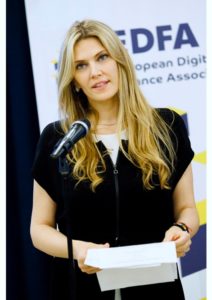
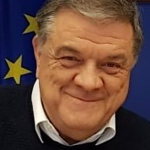
The payments were to get them to help influence MEPs to vote through various measures favourable to Qatar. The money, which came from both Qatar itself and from the government of Mauritania, was sent via the Brussels-based entity, ironically called “Fight Impunity”. It was co-created by Panzeri. The aim of OAFCN is to deter and even prevent fraud by creating a continuous, permanent dialogue with strengthened cooperation and joint communication initiatives. If something is constantly brought to the public’s attention and talked about it becomes harder to hide wrongdoing effectively. Tangled webs – however tangled and despite the presence of their many-legged weavers – can still fall victim to the feather duster of justice, if it is wielded skilfully enough. OLAF seems determined to do exactly that.
| ANY MORE TO PLAY?
It’s not only Qatar that has come under the investigators’ spotlight. There is also concern about tiny Morocco, which, according to Belgian Justice Minister Vincent Van Quickenborne, has long been known to be interfering in EU affairs, when it can. Investigations have so far focussed on various aspects of relations, including agreements on both fisheries and trade. According to Britain’s Financial Times, Panzeri, among others, received bribes, gifts and luxury hotel stays from the Moroccan government and he had various links with Moroccan politicians and officials. “Like Webster’s Dictionary we’re Morocco bound,” sang Bing Crosby and Bob Hope in 1942, but now the expression could just mean having the handcuffs applied there for committing fraud. If you’re still in doubt, remember that various people accused of corruption have admitted wrongdoing: Francesco Giorgi, the partner of another of the accused, Parliament Vice-President Eva Kaili, has confessed to accepting money for not being critical of Qatar in a debate. Panzeri, too, took gifts and luxurious hotel accommodation in return for (among other things) asking the European Commission to provide additional funds for Morocco. One can somehow imagine a conversation in the Hemicycle Bar: “Which way are you going to vote in that debate on Qatar and Morocco?” “How much are you offering?” All work on and with Qatar was suspended in December 2022, pending a formal investigation, which is still under way.
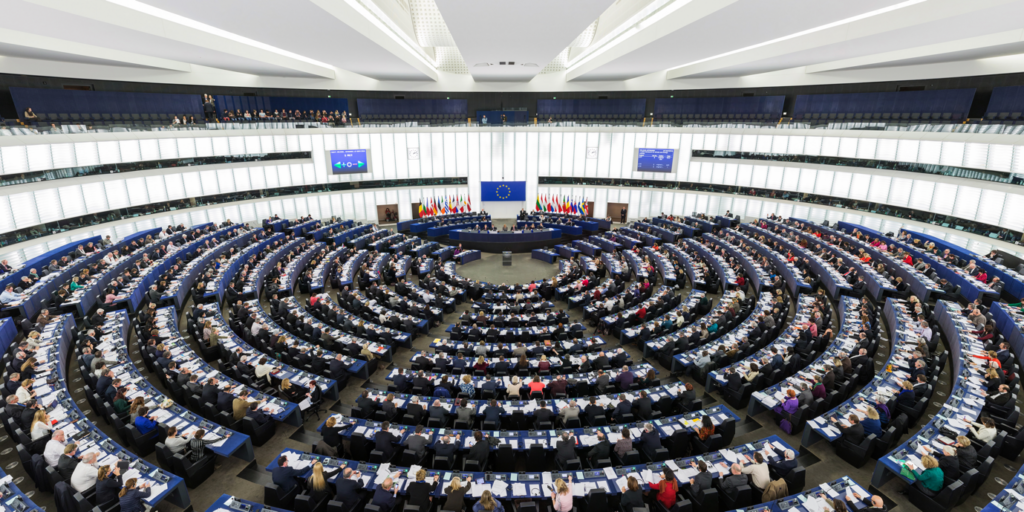
Now the European Parliament has made plain its intention to “increase the EU’s defences against dirty money”, which has to be a good thing, although some might say the move is somewhat overdue. It aims to achieve this, says Transparency International in a press release, by “bolstering the powers of the forthcoming anti-money laundering authority to fixing risky investment migration schemes, the Parliament is tightening the screws on the corrupt”. MEPs seem to have taken onboard the concerns previously expressed and has included “strong measures for ensuring that civil society, the media and academia are able to find out who’s behind anonymous companies created across the EU.” Their continuing existence has been a long-term concern for the Union. It’s a big step forward: it was only last year that the EU’s highest court struck down the anti-money laundering provision that would have resolved the issue. At last, the EU will get the corporate, economic, and fiscal transparency most of us probably hoped it had already. Two-and-a-half cheers for the European Parliament! It has taken too long to do this to merit the full three cheers, I’m afraid.
What all this will mean for entities like Qatar and Morocco, who like to be the ones pulling the strings for their own advantage, we’ll have to wait and see. Two things seem certain. Firstly, the new laws will make this sort of plaudit-seeking corruption harder to set up and harder keep safely below the radar, too. Secondly – and this is very definite, sadly – it won’t stop them from trying. Stories about corruption and graft will still be filling our newspapers a hundred years from now. We just have to hope that rather more of the crooks and influence-seekers will be resting behind bars for their efforts. There will be plenty of others, though, of course, just outside and eagerly carrying on their work and pocketing the profits. In the General Prologue to Geoffrey Chaucer’s great 14th century epic poem, The Canterbury Tales, the speaker gives money to a rough-sleeping pauper, “And thus, with feyned flatterye and japes, [with false flattery and jokes] He made the person and the people his apes.”
